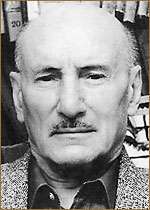Sergei Gerasimov (film director)
Sergei Appolinarievich Gerasimov (Russian: Серге́й Апполина́риевич Гера́симов; 21 May 1906 – 26 November 1985) was a Soviet film director and screenwriter. The oldest film school in the world, the VGIK, bears his name.
Sergei Gerasimov | |
|---|---|
 Sergei Gerasimov | |
| Born | Sergei Appolinarievich Gerasimov 21 May 1906 |
| Died | 26 November 1985 (aged 79) |
| Occupation | Film director, screenwriter, actor |
| Years active | 1924–1985 |
| Spouse(s) | Tamara Makarova |
Gerasimov started his film industry career as an actor in 1924. At first he appeared in Kozintsev and Trauberg films, such as The Overcoat and The New Babylon. Later, he was commissioned to produce screen versions of the literary classics of socialist realism. His epic screenings of Alexander Fadeyev's The Young Guard (1948) and Mikhail Sholokhov's And Quiet Flows the Don (1957–58) were extolled by the authorities as exemplary.
During several decades of their teaching in the VGIK Gerasimov and his wife Tamara Makarova prepared many generations of Russian actors. In his last film Gerasimov played Leo Tolstoy, while Makarova was cast as Tolstoy's wife. Gerasimov is buried in the Novodevichy Cemetery of Moscow.
Moscow Film Festival
Gerasimov was the President of the Jury at the 1959,[1] 1965,[2] 1969[3] and the 1985[4] Moscow International Film Festival. He was a member of the jury in 1961[5] and 1971.[6]
In 1967 his film The Journalist won the Grand Prix at the 1967 festival.[7]
Awards and honours

- Hero of Socialist Labour (1974)
- Four Orders of Lenin
- Order of the October Revolution
- Order of the Red Banner of Labour, twice (1940, 1950)
- Order of the Red Star (1944)
- People's Artist of the USSR, 1948
- Stalin Prize;
- 1941 2nd class – for the film "Master" (1939)
- 1949 1st class – for the film "Young Guard" (1948)
- 1951 1st class – for the film "Liberated China" (1950)
- Lenin Komsomol Prize (1970) – the creation of films about young people, and the Lenin Komsomol bolshuyuobschestvenno and political activities
- USSR State Prize (1971) – for the film "The Lake" (1969)
- Lenin Prize (1984) – for the movies in recent years
- Order of the White Lion, 3rd class (Czechoslovakia)
- Professor of the Gerasimov Institute of Cinematography in Moscow (1946)
- Member of the USSR Academy of Pedagogical Sciences (1978)
- Supreme Soviet of the Soviet Union (1950–1958)
- Doktor nauk (1967)
- Member of the Presidium of the Soviet Peace Committee (since 1950)
- Secretary of the Composers' Union
- Member of the USSR Writers' Union
Filmography
- Director
- Seven Brave Men (1936)
- City of Youth (1938)
- Komsomolsk (1938)
- The New Teacher (1939)
- Masquerade (1941)
- The Mainland (1944)
- The Young Guard (1948)
- The Village Doctor (1951)
- The New China (1952)
- Great Mourning (1953)
- And Quiet Flows the Don (1958)
- Men and Beasts (1962)
- The Journalist (1967)
- By the Lake (1969)
- The Love of Mankind (1972)
- Daughters-Mothers (1974)
- Red and Black (1976)
- The Youth of Peter the Great (1980)
- At the Beginning of Glorious Days (1980)
- Lev Tolstoy (1984)
- Actor
- Mishki versus Yudenich (1925)
- The Devil's Wheel (1926)
- The Overcoat (1926)
- The Club of the Big Deed (1927)
- Somebody Else's Coat (1927)
- Little Brother (1927)
- Fragment of an Empire (1929)
- The New Babylon (1929)
- Alone (1931)
- The Deserter (1933)
References
- "1st Moscow International Film Festival (1959)". MIFF. Archived from the original on 16 January 2013. Retrieved 27 October 2012.
- "4th Moscow International Film Festival (1965)". MIFF. Archived from the original on 16 January 2013. Retrieved 2 December 2012.
- "6th Moscow International Film Festival (1969)". MIFF. Archived from the original on 16 January 2013. Retrieved 17 December 2012.
- "14th Moscow International Film Festival (1985)". MIFF. Archived from the original on 16 March 2013. Retrieved 8 February 2013.
- "2nd Moscow International Film Festival (1961)". MIFF. Archived from the original on 16 January 2013. Retrieved 4 November 2012.
- "7th Moscow International Film Festival (1971)". MIFF. Archived from the original on 3 April 2014. Retrieved 22 December 2012.
- "5th Moscow International Film Festival (1967)". MIFF. Archived from the original on 16 January 2013. Retrieved 9 December 2012.